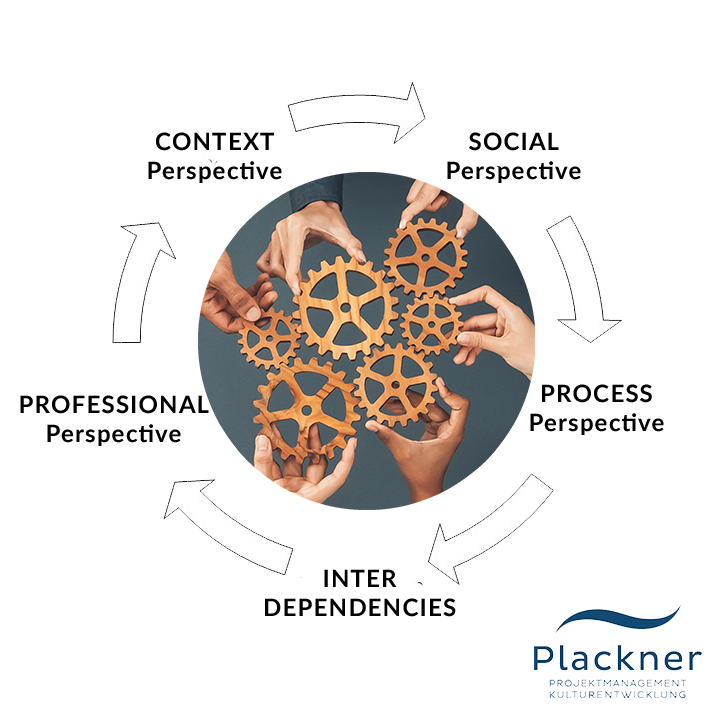
Systemic project management
By applying systemic principles in project management, complex challenges can be better managed. They promote holistic thinking and help to understand the effects of decisions and measures on the entire system. As a result, projects can be designed more effectively and sustainably.
What is systemic project management
While traditional project management usually focuses on the technical and process-related areas of project management, systemic project management involves several areas.

Professional perspective
What professional competencies are needed for successful project management? How and where do project staff need to be developed professionally?

Context perspective
What internal and external factors can influence the project?

Social perspective
How does good collaboration succeed? What influence do formal and informal structures have? What creates motivation in projects? How do you deal with conflicts professionally?

Process perspective
What is the role of the project manager? How is the project team put together? Which working methods and rules are defined for the project work?

Interdependencies
Which areas of the project are interconnected so that a change in one area automatically impacts another?

What Plackner Project Management & Culture Development can do for you:
Training of the project managers
if possible before the start of a project, but also during the course of the project and also after the failure of a project.
Coaching of a project
we advise, accompany and support the project team throughout the entire project and always have the project goals in mind. In the event of disruptions and conflicts, we intervene and support everyone involved in overcoming the challenges and refocusing on the project.
Systemic project management to rescue projects in trouble
If projects are in trouble or threaten to fail, this inevitably has negative consequences for the company and its organization: financial losses, loss of reputation, frustration and disappointment among employees and, last but not least, missed opportunities for market launches and innovations.
When is a project at risk of failing?
Time schedule can not be met
Budgets are exceeded
Insufficient stakeholder satisfaction (customers, users, clients)
Unstable and volatile project targets

Cause analysis
Accurately investigate what factors caused the project to go awry, both internal and external.

Learning & Reflection
The team reflects on the findings, giving them the chance to gain important insights for the future. Failure as a learning opportunity.

Communication and transparency
Open and honest communication about problems and risks in the project to the stakeholders promotes trust and enables to focus on solution approaches.

Reorientation & replanning
Can the project be continued in terms of objectives, scope, and available resources, or can it be rescheduled?

Motivation
Project participants need support to regain confidence and motivation.

Transfer of knowledge
It must be ensured that the knowledge gained and experience gained from the project is documented within the company and disseminated for future work.
Promote a culture of learning and continuous improvement. Consider failure as part of the innovation process and encourage your employees to learn from mistakes and develop new approaches.
